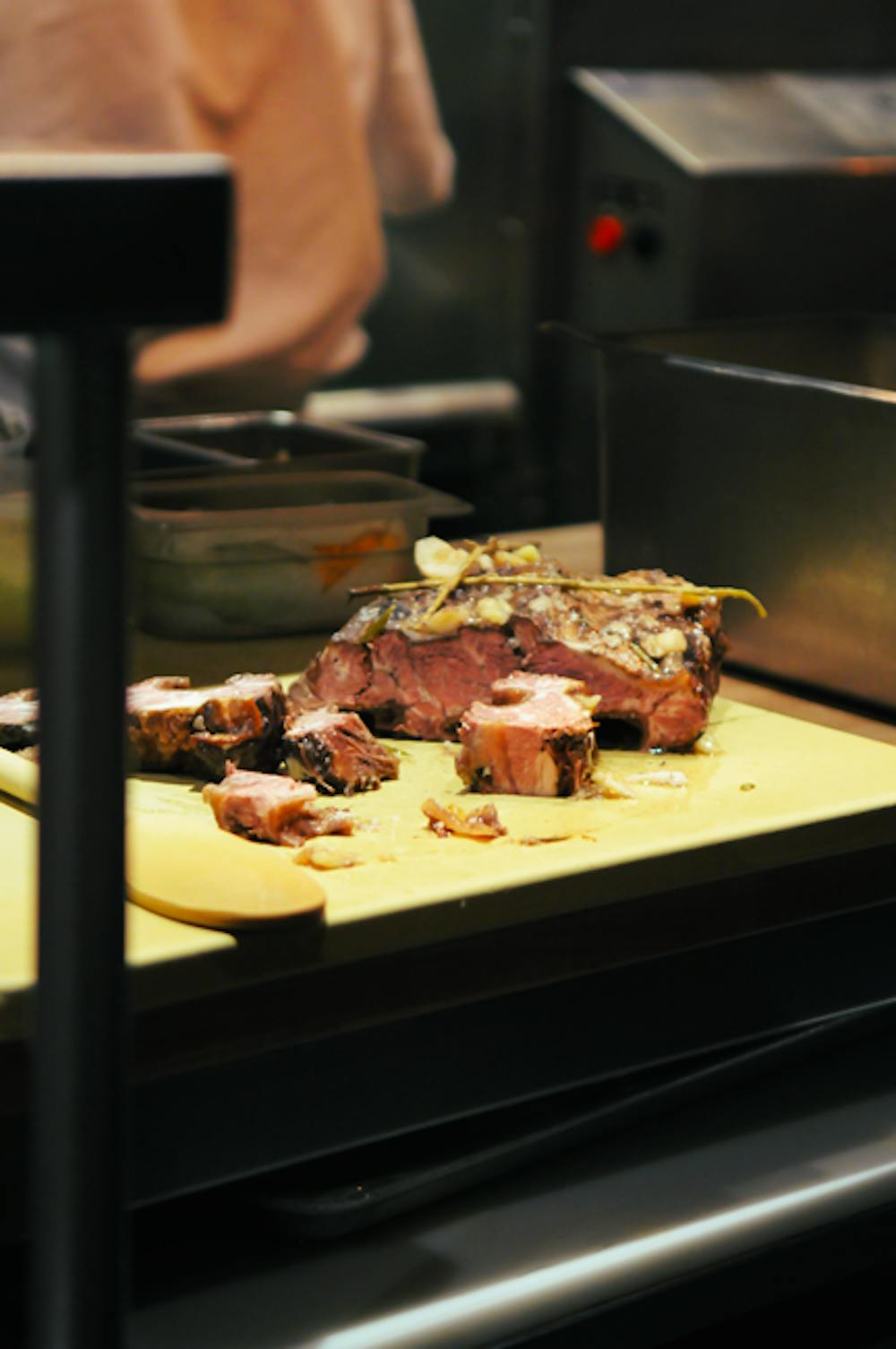Fine dining is a little like yoga, or meditation, or floating on your back in the middle of a Jacuzzi: the world gets really small when you do it. At Vetri, on 1312 Spruce St., it’s a world of glass from Murano, of wooden tables and floors. It’s a world of dimmed lights; it’s a world of Prosecco. Dinner there, for the yogis and the meditators and the Jacuzzi–floaters, is a two–and–a–half hour affair: they see a hand–painted menu and are asked their culinary preferences, and they get served a $155 tasting menu of the chef de cuisine’s choice. But I did not come for this. I came for the other world, behind the Murano glass. The world of pots and pans and shouting, of glistening fat and sinewy muscle. The world of cursing and ass–slapping and unhinged laughter: the back of the house.
4:30pm: Kitchen smells like bread I arrive at 4:30pm, when the Vetri staff — both the front of the house and the back — gather for what is called the family meal: a big vat of pasta, perhaps, some vegetables, a protein, some bread. Tonight, it’s pasta with tomatoes, parmesan and tripe; spinach salad; homemade hummus; and raw vegetables sliced into perfect batons. Bread — bread with a salty cap of crust so black it looks outlined in sparkly Sharpie — is set alongside. They give me plates and tell me to help myself, and they push me towards the front of the line. When one server sees me hesitate, she whispers, “Eat up. It’s gunna be a long night.” So I do. I take bread and pasta and hummus and those vegetables, and I join the front–of–house staff for a meeting in the dining room. (The chefs, they tell me, eat standing up.) They sit in their T–shirts and their sweatshirts and their jeans and they chat like the friends that they are, the friends who see each other every day, at this very hour, six days a week. It all feels so Italian, the way they scoop up their sauce with their bread and the way they talk about wine and the way they throw their heads back and laugh with each other, at each other.
5:02pm: Kitchen smells like aging beef The lights are bright out there in the dining room, but they are brighter here in the kitchen. The four chefs on the line, the ones who work the pasta station, the meat station, the fish station and the cold food and dessert station, all work in a small alley in between their respective gadgets — the flattop, the stove, and the oven — and a long island in the middle of the narrow kitchen. They are dressed identically: clogs, baggy chef pants, white chef coats and bright orange aprons. They smile, waving to me from their posts. Adam Leonti, the chef de cuisine, shows me my spot for the night: right next to him, the expeditor, at the front of the kitchen. He is tall, with bright eyes and a full beard, a Maine native who, like much of the staff, started off at the more casual Marc Vetri restaurant Osteria. He hauls a side of aged beef to his station, peeling away the snowy–white fat, talking to me of his breaks (few), of dinner prep (hard), of his workday (long). When I look back down at the cutting board, the cow is neatly portioned into smooth, marbled steaks. I hadn’t even noticed he was moving.
5:17PM: Kitchen smells like bacon I follow Adam out into the dining room. The front–of–house staff is dressed for service, the men in suits or vests, the women in dark grey dresses. Jazz plays softly in the background; they all drink espresso. It’s the dinner party of my dreams, where people talk of paccheri from Gragnano and candied lime zest and the crates of wine they just received. “Pique their interest,” they say, when they talk of explaining the wine list to guests. “Make them laugh.” Adam goes through the menu changes for the night, and reiterates standard protocol: 1) “Don’t be lazy.” 2) “Keep conversation professional out here — we can talk dirty in the kitchen.” 3) “Don’t cut anyone off if they have a pile of plates.” He pauses. “But never, ever cut off a guest…this is the Vetri brothel, as you know.”
6:02pm: Kitchen smells like sausage “Salumi for two!” calls out Meredith, a server, flying into the kitchen to grab two glasses of Prosecco. “Salumi for two!” booms Adam. “Salumi for two!” echoes Christina, the sole woman chef, from the back of the line. Adam cuts two slices of each homemade salumi. They glisten. Then, the torta d’erbe: a dense, cheesy bread of sorts, filled with cooked vegetables. Two toasts with foie gras pastrami appear from the back, along with a bowl filled with vegetables so fresh they look electric. Adam plates four cubes of apples and sprinkles them with parmesan. The spread is ready; it’s been a minute. Meredith picks it up. Adam takes a pig–shaped cutting board and makes me a salumi for one. I eat it with my fingers.
6:34pm: Kitchen smells like marrow Adam stands at the front of the kitchen, the tickets — sheets of paper written out by the servers — lined up in front of him. He explains that when tables are seated at the same time, he fires their tickets — or calls out their orders — together. Justino, the chef at the pasta station, opens a metal drawer next to the vat of boiling water. It is filled with pasta: perfect tiny envelopes, bundles of strands with crimped edges, little sacks that look like sucking candy. He puts a fistful of butter into a sauté pan and adds a few tortellini, tossing the pasta into the air with a flick of his wrist. I stare. He takes a spoon and tastes it, adds a ladle of pasta water, some salt. The hot plates of food get lined up one side of the front entryway; the cold plates on another. Adam goes through and takes bites with his fingers and with spoons, drizzling plates with Sicilian olive oil. When they’re ready, he calls out to the dining room, cocking his head to be heard through the door. The servers arrive; the plates, whisked away. A dish appears before me: tiny, yellow shapes in a scalloped porcelain bowl. Then, a fork. “For you,” Adam says, and Josh, the young, cheerful bartender, pours me the paired wine. The pasta is with saffron, bone marrow, orange zest and fennel. It is bright, floral and fatty.
7:27pm: Kitchen smells like rosemary The kitchen is humming, rumbling: a carwash, as Adam puts it. Everyone — the chefs, the dishwashers, the bartender — is hunched over, concentrating, working their tiny piece of real estate like they’d play a piano or a guitar. Kristina wields a charred rib–eye like a tennis racket, grasping the bone with her hand. She places it on a mirrored plate and wreathes it in rosemary, then walks it up to the front of the kitchen. Bill, one of the servers, brings it out to show the guest: more a crown jewel than a piece of meat. A minute later, it is brought back into the kitchen to be carved and sliced, placed over a simple sunchoke puree and topped with mushrooms and a dark, earthy sauce. The back door bangs open, and a man with a beard and eggplant–colored pants walks in. He is smiling. It is Marc Vetri.
9:03pm: Kitchen smells like brown butter “You need me?” Vetri asks Justino. “We always need you, chef.” He points to me. “Brette, write that down.” He puts a hunk of butter on the stove and gets to work.
9:42pm: Kitchen smells like saffron Jeff Benjamin, Vetri’s busness partner, is now watching over the kitchen, leaning back against the plating station. He is in a pinstripe suit; his shoes are shiny. Vetri, a foot taller, stands next to him. Adam brings over a bowl of pasta so vibrantly yellow it looks almost fake. Vetri leans over, takes a bite. His eyes close, then open. “This,” he says, “is amazing.”
11:08pm: Kitchen smells like sugar Someone wants a chocolate martini. “A chocolate martini?” Josh asks. “A chocolate martini.” “This isn’t Old City,” says Adam. “If it sucks, don’t give it to them.” Vetri strides into the kitchen from the dining room. “Oh what a night,” he sings, and he rubs everyone’s necks. The low hiss of floured fish in a hot pan fills the room as Adam fires another order.
12:22am: Kitchen smells like disinfectant The kitchen, as it turns out, is another world. It is a world of bright lights, of loud noises. It is a world where standing for 10 hours straight is the easiest thing in the world, and where butter and olive oil flow like rivers. It is a world where sticking your hand in someone’s food and your nose in someone’s glass is not just normal, but necessary. It’s a world of food’s hard realities: the snowy–white fat cap on the top of a prosciutto, the crusty edges of a pot of polenta, the murky consequence of vodka and chocolate shaken together. There are stains and there are crumbs and there are spots all over, but it smells good and there’s laughter and starchy pasta water to hold it together. It’s a world where big, broad, confident movements can produce the most delicate of plates, a world where artwork leaves and doesn’t return.
Brette Warshaw is a senior from Westport, CT. She is studying European History.







